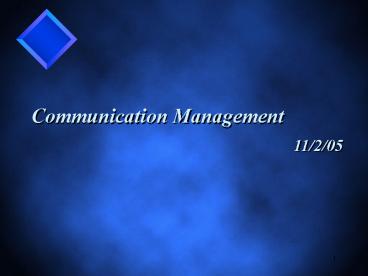Communication Management - PowerPoint PPT Presentation
1 / 30
Title:
Communication Management
Description:
A technique for expressing ideas effectively ... Preconceived ideas. Communication skills. Frame of reference. Needs. Personality and interest ... – PowerPoint PPT presentation
Number of Views:2937
Avg rating:3.0/5.0
Title: Communication Management
1
Communication Management
11/2/05
2
Communications Defined
- Effective project communication is needed to
ensure - that we get the right information
- to the right person
- at the right time
- using the right media
- and the right format and in a cost-effective
manner.
3
Communications Responsibility
- The project manager must know
- What kind of message to send
- To whom to send the message
- How to translate the message into a language that
all can understand
4
Communications
- An exchange of information
- An act or instance of transmitting information
- A verbal or written message non-verbal, too!
- A technique for expressing ideas effectively
- A process by which meanings are exchanged between
individuals through a common system of symbols
5
Types of Communication
- Written formal
- Written informal
- Oral formal
- Oral informal (preferred by project managers)
6
Communication Channels
UPWARD
COMMUNICATION
TO
MANAGEMENT
LATERAL COMMUNICATION
LATERAL COMMUNI-
PROJECT
TO FRIENDS, SOCIAL GROUP
CATION TO PEERS,
MANAGER
FUNCTIONAL GROUPS
AND BOTH FORMAL AND
AND CUSTOMERS
INFORMAL ORGANIZATIONS
LATERAL COMMUNICATION
TO ASSOCIATES AND
THE PROJECT OFFICE
7
Customer-Contractor Communication
Contractor
Customer
Informal
Sponsor
Sponsor
Formal
Project
Project
Manager
Manager
Informal
Employees
Employees
8
Total Communication Process
REGION OF EXPERIENCE FOR SOURCE
REGION OF EXPERIENCE FOR RECEIVER
MESSAGE
SOURCE
RECEIVER
ENCODER
DECODER
PERSONALITY
PERCEPTION
SCREEN
SCREEN
FEEDBACK
PERSONALITY
SCREEN
PERCEPTION
SCREEN
9
Encoding Barriers
- Communication skills
- Frame of reference - filter
- Sender credibility
- Personality and interests
- Interpersonal sensitivity
- Attitude, emotion, and self-interest
- Position Status
- Assumptions and existing relationships with
receivers
10
Decoding Barriers
- Evaluative tendency
- Preconceived ideas
- Communication skills
- Frame of reference
- Needs
- Personality and interest
- Attitudes, emotion, and self-interest
- Position and status
11
Decoding Barriers (Continued)
- Assumptions about sender
- Existing relationship with sender
- Lack of responsive feedback
- Selective listening
12
Understanding Barriers
- Listening skills
- Culture
- Intelligence
- Knowledge base
- Semantics
- Situational consideration
- Emotional status
- Authority or position
- Common sense
13
Internal Factors
- Power games
- Withholding information
- Management by memo
- Reactive emotional behavior
- Mixed messages
- Indirect communications
- Stereotyping
- Transmitting partial information
- Blocking or selective perception
14
External Factors
- The business environment
- The political environment
- The economic climate
- Regulatory agencies
15
Environmental Factors
- Logistics/geographic separation
- Personal contact requirements
- Group meetings
- Telephone
- Correspondence (frequency and quantity)
- Electronic mail
16
Ambiguity
- Ambiguity causes us to hear what we want to hear.
- Ambiguity causes us to hear what the group wants.
- Ambiguity causes us to relate to past experiences
without being discriminatory.
17
Perhaps as much as 90 percent or more of the time
the project manager spends in providing project
direction involves some form of communications.
18
Meetings
- Daily
- Weekly/Monthly
- Irregular
19
Written media
- Individually oriented media These include
letters, memos, and reports. - Legally oriented media These include contracts,
agreements, proposals, policies, directives,
guidelines, and procedures. - Organizationally oriented media These include
manuals, forms, and brochures.
20
Six Steps
- Think through what you wish to accomplish.
- Determine the way you will communicate.
- Appeal to the interest of those affected.
- Give feedback on ways others communicate to you.
- Get feedback on what you communicate.
- Test effectiveness through reliance on others to
carry out your interactions.
21
Barriers
- Receiver hearing what he wants to hear. This
results from people doing the same job so long
that they no longer listen. - Sender and receiver having different perceptions.
This is vitally important in interpreting
contractual requirements, statements of work, and
proposal information requests. - Receiver evaluating the source before accepting
the communications.
22
Barriers
- Receiver ignoring conflicting information and
doing as he pleases. - Words meaning different things to different
people. - Communicators ignoring nonverbal cues.
- Receiver being emotionally upset.
23
Conclusions
- Dont assume that the message you sent will be
received in the form you sent it. - The swiftest and most effective communications
take place among people with common points of
view. The manager who fosters good relationships
with his associates will have little difficulty
in communicating with them. - Communications must be established early in the
project.
24
Communication Styles
- Authoritarian Gives expectations and specific
guidance - Promotional Cultivates team spirit
- Facilitating Gives guidance as required, but not
interfering - Conciliatory Friendly and agreeable while
building a compatible team - Judicial Uses sound judgment
25
Communication Styles (cont)
- Ethical Honest, fair and by the book
- Secretive Not open or outgoing
- Disruptive Breaks apart unity of group
- Intimidating Tough guy, and can lower morale
- Combative Eager to fight or be disagreeable
26
Administrative Closure
- Records Management
- Minutes
- Memos
- Newsletters
- Reports
- Specification changes
- Contractual documentation
27
Administrative Closure
- Project Archives
- Project records
- Update historical databases
- Financial records
- Security of critical information
28
Project Team Development
- Team Development
- Training
- Team Building Activities
- Common Project Team Activities
- Communication Plan
- Status Reports
- Project Plan Work Breakdown Structure
- Roles/Responsibilities
29
Quotes
- Nine women cant make a baby in a month.(So,
sometimes throwing more resources on a task will
have no effect.) - The most valuable and least used word in a
project managers vocabulary is NO. - What is not on paper has not been said.Document,
document, document! - The conditions attached to a promise are
forgotten and the promise is remembered.Document,
document, document!
30
Assignments
- Work on project































